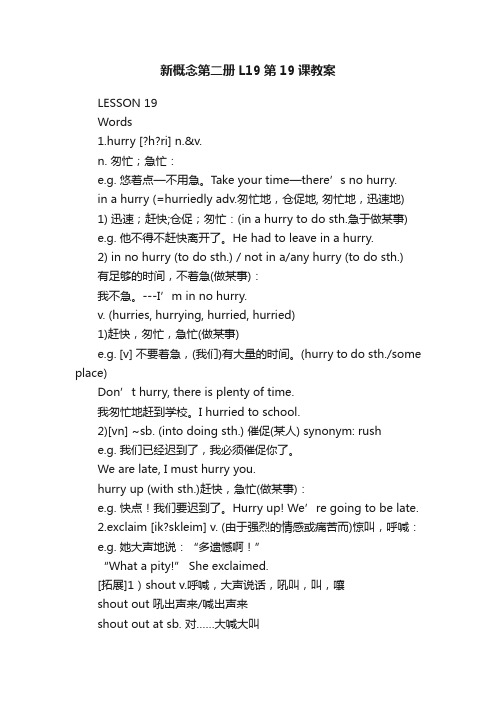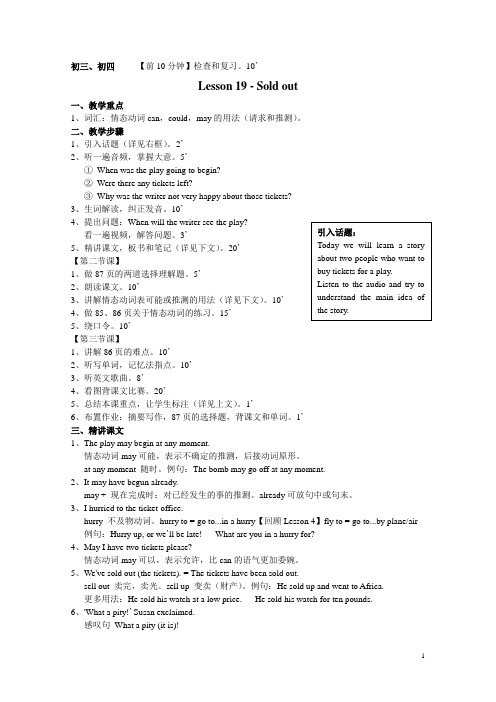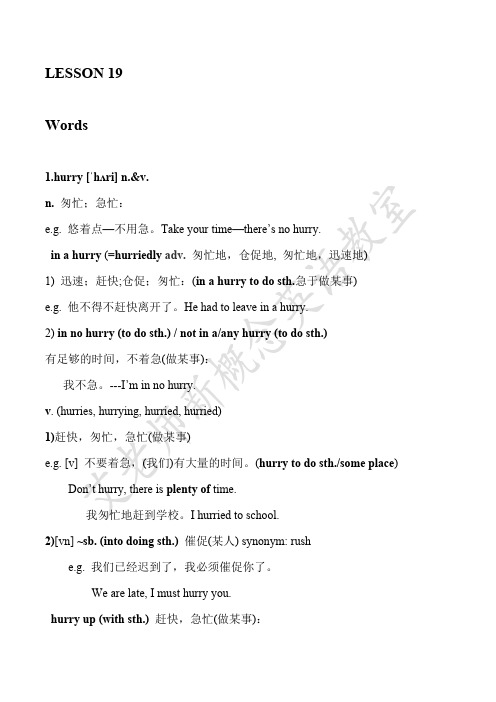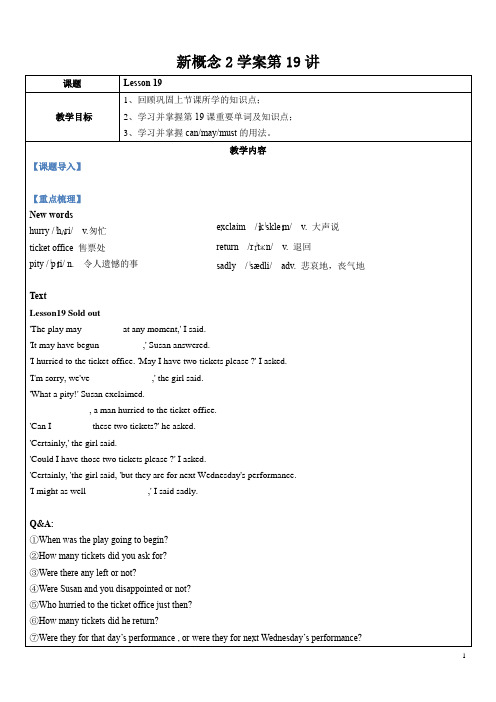新概念第二册 L19 第19课教案
新概念第二册L19第19课教案

新概念第二册L19第19课教案LESSON 19Words1.hurry [?h?ri] n.&v.n. 匆忙;急忙:e.g. 悠着点—不用急。
Take your time—there’s no hurry.in a hurry (=hurriedly adv.匆忙地,仓促地, 匆忙地,迅速地)1) 迅速;赶快;仓促;匆忙:(in a hurry to do sth.急于做某事)e.g. 他不得不赶快离开了。
He had to leave in a hurry.2) in no hurry (to do sth.) / not in a/any hurry (to do sth.)有足够的时间,不着急(做某事):我不急。
---I’m in no hurry.v. (hurries, hurrying, hurried, hurried)1)赶快,匆忙,急忙(做某事)e.g. [v] 不要着急,(我们)有大量的时间。
(hurry to do sth./some place)Don’t hurry, there is plenty of time.我匆忙地赶到学校。
I hurried to school.2)[vn] ~sb. (into doing sth.) 催促(某人) synonym: rushe.g. 我们已经迟到了,我必须催促你了。
We are late, I must hurry you.hurry up (with sth.)赶快,急忙(做某事):e.g. 快点!我们要迟到了。
Hurry up! We’re going to be late.2.exclaim [ik?skleim] v. (由于强烈的情感或痛苦而)惊叫,呼喊:e.g. 她大声地说:“多遗憾啊!”“What a pity!” She exclaimed.[拓展]1)shout v.呼喊,大声说话,吼叫,叫,嚷shout out 吼出声来/喊出声来shout out at sb. 对……大喊大叫2)scream v. (因伤痛、害怕、激动等)尖叫、惨叫、惊叫exclamation[?ekskl??me??n] n. 感叹;感叹语;感叹词exclamation mark 感叹号3.return v. 1) 回来;回去;返回e.g. 你什么时候回到伦敦?When are you returning to London?2) 带回;送回;放回;归还,退还~sb./sth.(to sb./sth.)e.g.我准备去图书馆还书。
【ppt课件】新概念第二册第19课课件-精品文档

• How many kinds of tickets can I buy?
• If I want to buy a ticket,what can I say? • Can(May) I have a ticket,please? • If I want to return the ticket,what can I say? • Can I return the ticket? • If there aren't any tickets,what can I say? • What a pity!
“ The play may begin at any moment,” I said. “It may have begun already,” Susan answered.
at any moment: immediately, at once
随时都可能下雨。
It may rain (at) a arrive at any moment. may have begun: Her friend may have gone abroad. They may be waiting for you at the airport.
Lesson 19 Sold out
Yes, I did.
• Who was with you ?
Susan was.
• She thought the play might have begun already, didn't she ? • What did you do?
I hurried to the ticket office. Yes, she did.
d. wasn’t too pleased to get tickets for next Wednesday’s performance.
新概念英语第2册课件Lesson19(共15页)

4. We may go climbing in the Alps next summer. 5. --Can the news be true? --- It can’t be true.否
定时一定用cபைடு நூலகம்n’t ,may只用于肯定.
6. All the pubs are closing. We may as well go home.还是...好,不妨
7. -- I’ll go on Monday by train. -- You might just
as well wait till Tuesday and go by plane.
When was the play going to begin? Were there any tickets left? Why was the writer not very happy about those tickets?
1.may might, can /could / might as well
1. a 2. d 3. c 4. c 5. d 6. b 7. c 8. b 9. c 10. a 11. c 12. c
2. hurry to / hurry up / hurry off / in a hurry
3. sell sold sold / sold out / sell up / sell …at a low price/ sell…for $300
4. what a pity (it is) ! / That’s a pity! 5. exclaim / shout /cry 6. a return ticket / a single ticket 7. certainly / sure / of course
Rita-新概念英语教案 第二册 19--

初三、初四【前10分钟】检查和复习。
10’Lesson 19 - Sold out一、教学重点1、词汇:情态动词can,could,may的用法(请求和推测)。
二、教学步骤1、引入话题(详见右框)。
2’2、听一遍音频,掌握大意。
5’①When was the play going to begin?②Were there any tickets left?③Why was the writer not very happy about those tickets?3、生词解读,纠正发音。
10’4、提出问题:When will the writer see the play?5、精讲课文,板书和笔记(详见下文)。
20’【第二节课】1、做87页的两道选择理解题。
5’2、朗读课文。
10’3、讲解情态动词表可能或推测的用法(详见下文)。
10’4、做85、86页关于情态动词的练习。
15’5、绕口令。
10’【第三节课】1、讲解86页的难点。
10’2、听写单词,记忆法指点。
10’3、听英文歌曲。
8’4、看图背课文比赛。
20’5、总结本课重点,让学生标注(详见上文)。
1’6、布置作业:摘要写作,87页的选择题,背课文和单词。
1’三、精讲课文1、The play may begin at any moment.情态动词may可能,表示不确定的推测,后接动词原形。
at any moment 随时。
例句:The bomb may go off at any moment.2、It may have begun already.may + 现在完成时:对已经发生的事的推测。
already可放句中或句末。
3、I hurried to the ticket-office.hurry 不及物动词。
hurry to = go to...in a hurry【回顾Lesson 4】fly to = go to...by plane/air 例句:Hurry up, or we’ll be late! What are you in a hurry for?4、May I have two tickets please?情态动词may可以,表示允许,比can的语气更加委婉。
新概念第二册 L19 第19课教案教学教材

LESSON 19Words1.hurry [ˈhʌri] n.&v.n. 匆忙;急忙:e.g. 悠着点—不用急。
Take your time—there’s no hurry.in a hurry (=hurriedly adv.匆忙地,仓促地, 匆忙地,迅速地)1) 迅速;赶快;仓促;匆忙:(in a hurry to do sth.急于做某事)e.g. 他不得不赶快离开了。
He had to leave in a hurry.2) in no hurry (to do sth.) / not in a/any hurry (to do sth.)有足够的时间,不着急(做某事):我不急。
---I’m in no hurry.v. (hurries, hurrying, hurried, hurried)1)赶快,匆忙,急忙(做某事)e.g. [v] 不要着急,(我们)有大量的时间。
(hurry to do sth./some place)Don’t hurry, there is plenty of time.我匆忙地赶到学校。
I hurried to school.2)[vn] ~sb. (into doing sth.) 催促(某人) synonym: rushe.g. 我们已经迟到了,我必须催促你了。
We are late, I must hurry you.hurry up (with sth.)赶快,急忙(做某事):e.g. 快点!我们要迟到了。
Hurry up! We’re going to be late.2.exclaim [ikˈskleim] v. (由于强烈的情感或痛苦而)惊叫,呼喊:e.g. 她大声地说:“多遗憾啊!”“What a pity!” She exclaimed.[拓展]1)shout v.呼喊,大声说话,吼叫,叫,嚷shout out 吼出声来/喊出声来shout out at sb. 对……大喊大叫2)scream v. (因伤痛、害怕、激动等)尖叫、惨叫、惊叫exclamation[ˌekskləˈmeɪʃn] n. 感叹;感叹语;感叹词exclamation mark 感叹号3.return v. 1) 回来;回去;返回e.g. 你什么时候回到伦敦?When are you returning to London?2) 带回;送回;放回;归还,退还~sb./sth.(to sb./sth.)e.g.我准备去图书馆还书。
新概念第二册lesson19PPT课件

介绍定语从句的定义,说明限制性定语从句和非限制性定语从句的区别。
定语从句概念及种类
定语从句的构成和用法
非谓语动词概念及种类
非谓语动词的构成和用法
详细解释定语从句的构成方式,包括关系代词和关系副词的选用,给出相应的例句。
阐述非谓语动词的定义,列举常见的非谓语动词形式,如不定式、动名词和分词。
详细解释非谓语动词的构成方式,包括动词形式的变化和句子成分的搭配,给出相应的例句。
重点词汇2
championship(锦标赛)
例句
He won the world championship in tennis last year, making him one of the best players in the world.
重点词汇3
enthusiasm(热情)
例句
The crowd showed their enthusiasm for the home team by cheering and waving flags throughout the game.
针对不足之处进行反复练习,直至熟练掌握。
分享经验
邀请几位口语表达能力较强的同学分享自己的经验和技巧。
讨论问题
小组讨论中,同学们可以提出自己在口语表达中遇到的问题和困难。
互相鼓励
鼓励同学们大胆开口,不怕犯错,相互激励共同进步。
制定计划
根据个人情况制定口语提升计划,包括练习时间、方法、目标等。
06
语态概念及种类
语态的构成和用法
介绍时态的定义,列举常见的时态类型,如一般现在时、一般过去时、一般将来时等。
阐述语态的定义,说明主动语态和被动语态的区别,列举常见的被动语态形式。
新概念2-Lesson19讲义

新概念2学案第19讲⑧Did you buy them or not?一、重要知识点1. Sold outsell v.v. 过去时___________过去分词________________标题中的sold out 前被省略了____________________。
例题精讲The cake ________well. Today’s cakes ______________ at 11:00 a.m.A.is sold; were sold outB.sells; were sold outC. is sold ; sold outD.sells;sold out总结:当表示“销售好、卖的好”时,表达方式为_____________________, _______(有/无) 被动语态;当表示“卖光”时,表达方式为_____________________, _______(有/无) 被动语态;助记n. _____________ 销售,销售量✧This computers are in the factory now and three days later they will be for sale.✧Almost everything is on sale on the Internet on 11th November.总结:__________________________________________________________2.'The play may begin at any moment,' I said.关于moment的短语①You can come to me ___________________________, because we are best friends.②______________________, he was listening to the radio. That was why he didn’t hear the knock on the door.【等你来挑战】一、将课文补充完整。
新概念第二册第19课课件

这是一个复合句,主句是“I now found myself wondering what I had got myself into”,其中“Although I had been looking forward to this trip for weeks”是让步 状语从句,表示尽管主人公一直期待这次旅行,但他现在却发现自己陷入了困境。
所学知识;小结部分总结本课重点难点,鼓励学生自我评价和反思。
学习方法和建议
学习方法
本课采用讲解、示范、练习和反馈相结合的教学方法,注重学生的主体性和实践 性,通过大量的口语和写作练习提高学生的语言运用能力。
学习建议
学生在学习本课时应积极参与课堂活动,认真听讲、思考和练习;同时要注重课 后的复习和巩固,通过多读、多写、多听、多说等方式提高英语水平。此外,学 生还可以借助网络资源和英语学习社群等渠道拓展学习内容和交流机会。
THANKS
感谢观看
动词不定式的用法:作为主语 、宾语、定语、状语等,表示 具体的或一次性的动作。
语法规则详解
现在完成时的构成
have/has + 过去分词,其中have用于第一人称和第三人称复数,has用于第三人称单 数。
情态动词should/ought to的用法
should表示现在或将来的责任或义务,ought to表示过去或将来的责任或义务,两者 均后接动词原形。
针对发音不准确的问题,可以通过模仿和跟读的方式提高发音准确性。
听后反思及策略调整
针对速记技巧不够熟练的问题,可以 在平时的训练中多加练习,形成自己 的速记符号和缩写方式。
针对对题目理解不够深入的问题,可 以在做题前仔细阅读题目和选项,预 测听力材料的内容,并在听后仔细核 对答案和听力原文。
- 1、下载文档前请自行甄别文档内容的完整性,平台不提供额外的编辑、内容补充、找答案等附加服务。
- 2、"仅部分预览"的文档,不可在线预览部分如存在完整性等问题,可反馈申请退款(可完整预览的文档不适用该条件!)。
- 3、如文档侵犯您的权益,请联系客服反馈,我们会尽快为您处理(人工客服工作时间:9:00-18:30)。
LESSON 19Words1.hurry [ˈhʌri] n.&v.n. 匆忙;急忙:e.g. 悠着点—不用急。
Take your time—there’s no hurry.in a hurry (=hurriedly adv.匆忙地,仓促地, 匆忙地,迅速地)1) 迅速;赶快;仓促;匆忙:(in a hurry to do sth.急于做某事)e.g. 他不得不赶快离开了。
He had to leave in a hurry.2) in no hurry (to do sth.) / not in a/any hurry (to do sth.)有足够的时间,不着急(做某事):我不急。
---I’m in no hurry.v. (hurries, hurrying, hurried, hurried)1)赶快,匆忙,急忙(做某事)e.g. [v] 不要着急,(我们)有大量的时间。
(hurry to do sth./some place)Don’t hurry, there is plenty of time.我匆忙地赶到学校。
I hurried to school.2)[vn] ~sb. (into doing sth.) 催促(某人) synonym: rushe.g. 我们已经迟到了,我必须催促你了。
We are late, I must hurry you.hurry up (with sth.)赶快,急忙(做某事):e.g. 快点!我们要迟到了。
Hurry up! We’re going to be late.2.exclaim [ikˈskleim] v. (由于强烈的情感或痛苦而)惊叫,呼喊:e.g. 她大声地说:“多遗憾啊!”“What a pity!” She exclaimed.[拓展]1)shout v.呼喊,大声说话,吼叫,叫,嚷shout out 吼出声来/喊出声来shout out at sb. 对……大喊大叫2)scream v. (因伤痛、害怕、激动等)尖叫、惨叫、惊叫exclamation[ˌekskləˈmeɪʃn] n. 感叹;感叹语;感叹词exclamation mark 感叹号3.return v. 1) 回来;回去;返回e.g. 你什么时候回到伦敦?When are you returning to London?2) 带回;送回;放回;归还,退还~sb./sth.(to sb./sth.)e.g.我准备去图书馆还书。
I’m going to the library to return my books.n. 1) [c;u (from, to)] 返回,回来;往返e.g. return ticket 往返票我们盼望你从美国回来。
We look forward to your return from America.2. [u] 归还;回报4.pity [ˈpiti] n.&v.n.1) 同情;怜悯;遗憾(what a pity),可惜be full of pity for sb./be filled with pity for sb. 十分同情某人feel pity for sb. 对…表示同情have/take pity on sb. 同情怜悯某人e.g. 我同情她,就把钱借给了她。
I took pity on her and lent her the money.真遗憾,她没有早点告诉我。
What a pity that she didn’t tell me earlier.v.同情;怜悯;可怜e.g. 他同情那些没有工作的人。
He pitied people who were out of work.pitiful[ˈpɪtɪfl] adj. 令人同情的;可怜的pitiable [ˈpɪtiəbl] adj. 值得同情的;可怜的5.sadly[ˈsædlɪ]adv.1)令人遗憾;不幸地e.g. 可惜的是,我的时间有限。
Sadly, my time is limited.2.)in a sad way悲伤地;伤心地:e.g. 她难过地摇摇头。
She shook her head sadly.[复习]sad adj. (sadder, saddest)1) 悲哀的;难过的;显得悲哀的;令人悲哀的;让人难过的;e.g. 听说你要走了,我们十分难过。
We are very sad to hear that you are leaving.悲惨的故事;忧伤的诗;悲凉的歌a sad story/poem/songsadness n.Text1.sell [sel]v.&n.v. (sold, sold[səʊld])1)出售;售卖;出让;转让:~sth. (to sb.) (at/for sth.) / ~sb. sth. (at/for sth.)e.g. 我把我的汽车转让给了詹姆斯,获得800英镑。
I sold my car to James for /at 800 pounds.I sold James my car for/at 800 pounds.你这儿卖邮票吗?Do you sell stamps?2) 销售得…;卖出…;售价是… sell for /at 价格以…价格出售sell well畅销sell badly 滞销e.g. 这种杂志一周售出30万册。
The magazine sells 300,000 copies a week.sell oneself 自荐;自我推销:[拓展]1.Phr.v.1) sell out / be sold out (音乐会、足球赛等的门票) 售完:e.g.几小时内票就卖光了。
The tickets sold out within hours.sell out of sth. 脱销:e.g. 抱歉,我们的面包卖完了。
I’m sorry, we’ve sold out of bread.2)seller[ˈselə]n. 销售者;卖方(反义:buyer);(畅销、滞销等的)商品:e.g. a good/bad/poor seller 畅销/滞销的商品3)sale[seil]n. 出售;销售;销售量for sale 待售;供出售(尤指从主人手里)on sale 出售,上市;折价销售;减价出售:salesman n. 男售货员;男推销员saleswoman n. 女售货员;女推销员2.at this moment =now ;at that moment = then3.may/might as well do “还是…好,不妨”。
较勉强,不是非常乐意,不得不选一个。
两者一般可以互换。
e.g. –Do you think you’ll pass the exam? 你认为你会通过考试吗?--I’ll never pass. I might as well give up.我决不会通过考试的,我还是放弃的好。
Key structurecan/could/may/might1.can/ could1) can(过去式为could)意为“有能力”、“能够”:2)can (could)用于否定或疑问句中后面跟动词原形的完成式时,表示对过去发生事件的“可能性”。
而could较can更加表示说话人的“不肯定的”语气。
如:e.g. 他会是走了吗?Can he have left already?她会把我的地址忘记了吗?Could she have forgotten my address?3)can+not+动词原形表示否定推测意为“不可能”。
2.may/might1)表示“允许”或“请求”,询问或说明一件事可不可做e.g. 我能打扰一下问你一个问题吗?May I trouble you with a question?2) 表推测(或是某种情况可能会存在);may (might) +have done表示对过去发生的事情进行推测她今天可能不在那儿。
She may not be there today.注:在否定句中一般不用may not ,常用can’t 表示“不可能”。
例如:He can’t be at home tonight. 今晚他不可能在家。
3)may还可用在感叹句中来表示希望、祈求、祝愿,常可译为“祝愿”。
如:e.g. 希望那天快点到来。
May that day come soon.Special difficulties缩写。
Multiple choice questionKEY:1. a2. d3. c4. c5. d6. b7. c前一句子I might as well have them(我还是把他们买下来吧),表示说话人不情愿或勉强这样做。
a. verypleased(非常高兴),b. very glad(很高兴) 与d.delighted(极为高兴)都与这个句子的含义相反,只有c. not very glad 符合题目意思,因此选c.8. b 9. c 10. a只有a. give them back 与前面的returned(还给) 的意思相同,而其他3个选择b. give them in(交上它们), c. give them up (放弃它们) , d. give them off(发放它们) 都没有“归还”的意思。
11. c 12. c只有c. now 才能使句子同前面的句子Do you still want them? (你还想要它吗?)的意思吻合.而a. yet,b. even, d. more 都不符合语法和题目意思.。
